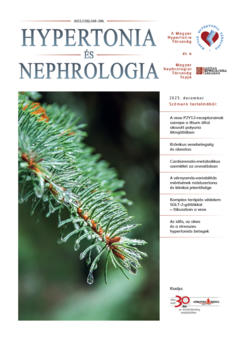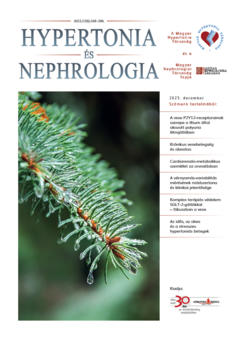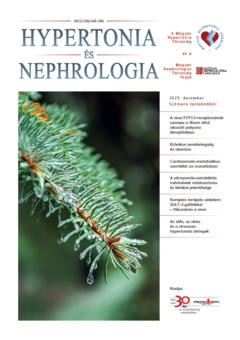The eLitMed.hu medical portal uses computer cookies for convenient operation. Detailed information can be found in the Cookie-policy.
Specialities
Cardiology
[Reno- and cardioprotective effects of sodium-glucose cotransporter 2 inhibitors beyond treating diabetes mellitus ]
[SGLT2-inhibitors, originally used as antidiabetics, improved unexpectedly the outcome of cardiac diseases (mainly heart failure) and nearly halved the risk of renal events of diabetic patients. More recently, administering these drugs decreased significantly the morbidity and mortality in primary renal endpoint studies and among patients with heart failure – in diabetic and non-diabetic patients respectively. Concerning these recent outcomes and according to international and domestic guidelines, SGLT-2 inhibitors are considered as first line medications in both chronic kidney disease and the whole spectrum of chronic heart failure, and they should be initiated as early as possible in these conditions. Since the beginning of 2024, these drugs which changed significantly the outcome of these diseases can be prescribed with greater support of Hungarian public financing not only for type 2 diabetic patients but non-diabetics too with chronic kidney diseases and heart failure with reduced ejection fraction. ]
[The place of rosuvastatin/acetylsalicylic acid fixed combination in the daily practice ]
[In Hungary, cardiovascular diseases are the leading cause of death; however, they have also a large share among preventable and treatable conditions. Statins and acetylsalicylic acid (ASA) play a prominent role in the secondary prevention of cardiovascular diseases. Their areas of application are wide, but at the same time, they are recommended for secondary prevention of many common cardiovascular diseases. Among acetylsalicylic acid and statin combinations, the ASA/rosuvastatin combination – if compared to other statins – reduced most significantly the risk of cardiovascular diseases. Other studies have highlighted the benefits of fixed drug combinations in cardiovascular risk reduction.
A new domestic fixed combination, containing that of ASA/rosuvastatin can claim a prominent position in the secondary prevention of cardiovascular diseases.]
[Chronic kidney disease and obesity]
[Nowadays, the epidemic spread of obesity is mainly linked to changing environmental factors and is a serious public health problem. Obesity alone can be associated with increased mortality, but obesity is also an independent risk factor for several chronic diseases such as diabetes, hypertension and chronic kidney disease which have a major public health burden.]
[Elderly, obes and stressed hypertension patients]
[Increased sympathetic nervous system activity can be found in all forms of hypertension, but the degree of this may differ depending on the individual accompanying diseases.]
[Methodology and clinical relevance of measuring blood pressure variability based on the consensus paper of the European Society of Hypertension]
[Blood pressure is an ever-changing vital parameter. Its observed variability over time is blood pressure variability, which is influenced by both regulatory mechanisms within the body and environmental factors affecting the body.]
[Hypothyroidism of the elderly – To treat or not to treat? ]
[Hypothyroidism is common in the elderly. Frequent causes of hypothyroidism include autoimmune disease of the thyroid gland, previous thyroid surgery and radioiodine therapy. Symptoms may be atypical, and the level of serum thyroid-stimulating hormone (TSH) must be measured as a part of the biochemical workup. Elevated serum TSH levels have to be confirmed with a repeated tests, which must be completed by measuring the serum thyroxine level too. The recommended and relevant replacement therapy for hypothyroidism is levothyroxine sodium administration. Levothyroxine sodium is orally only partially absorbed since it is affected by food, minerals, drugs and the composition of the tablet. The initial hormone replacement dose should be low if any heart disease is suspected. The main risk of levothyroxine sodium therapy is its over supplementation, the side effects of which may include anxiety, muscle atrophy, osteoporosis, and atrial fibrillation. Subclinical hypothyroidism with elevated serum TSH level but with a T4 level in its reference range may be considered as a mild form of hypothyroidism. Studies published so far did not prove the positive effect of substitution therapy for non-goitrous subclinical hypothyroidism, especially in elderly patients.]
1.
Clinical Neuroscience
[Headache registry in Szeged: Experiences regarding to migraine patients]2.
Clinical Neuroscience
[The new target population of stroke awareness campaign: Kindergarten students ]3.
Clinical Neuroscience
Is there any difference in mortality rates of atrial fibrillation detected before or after ischemic stroke?4.
Clinical Neuroscience
Factors influencing the level of stigma in Parkinson’s disease in western Turkey5.
Clinical Neuroscience
[The effects of demographic and clinical factors on the severity of poststroke aphasia]1.
2.
Clinical Oncology
[Pancreatic cancer: ESMO Clinical Practice Guideline for diagnosis, treatment and follow-up]3.
Clinical Oncology
[Pharmacovigilance landscape – Lessons from the past and opportunities for future]4.
5.








